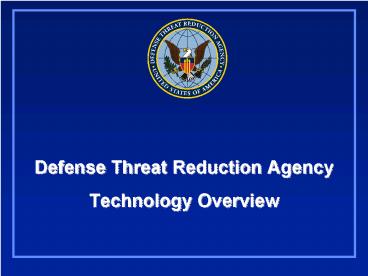Defense Threat Reduction Agency Technology Overview PowerPoint PPT Presentation
1 / 29
Title: Defense Threat Reduction Agency Technology Overview
1
Defense Threat Reduction AgencyTechnology
Overview
2
Agenda
- Who we are
- What we are doing
- What we seek to do
3
We Are a Combat Support Agency with Four Major
Components
- Partner with the CINCs, Services and DOE to
maintain the physical and doctrinal components of
nuclear deterrence - Provide the warfighter with the offensive and
defensive tools to prevail against WMD - Execute all treaty inspections, cooperative
agreements and technology control activities - Help lead and define DoDs role in supporting
local and state agencies in WMD terrorism
response operations
4
Issues We Confront
- Multipolar world
- National concern with terrorism
- Failed/failing states lack of positive control of
WMD capabilities and systems - Many chemical/biological weapons (CW/BW)
technologies inherently dual-use and broadly
distributed - Nuclear deterrence remains an effective, but
limited tool - DoD continuing to define a WMD civil response
role
5
A Worldwide Presence
National Capital Region
Russia
Ukraine
Germany
Tennessee
Kazakhstan
Japan
Nebraska
Utah
Nevada
California
New Mexico
Johnston Atoll
6
Organization and Relationships
USD(AT L)
JCS
Threat Reduction Advisory Committee
DDRE
DIRECTOR Deputy Director
USD(P)
Advanced Systems Concepts Office
Senior Advisors
Acquisition Management (AM)
Resource Management (RM)
Info Systems (IS)
Personal and Special Staff
Technology Development (TD)
On-Site Inspection (OS)
Cooperative Threat Reduction (CT)
Technology Security (ST)
CombatSupport (CS)
Chem-Bio Defense (CB)
Directorates Technology Supports
7
The CB Directorate Provides Direction for
Development and Acquisition of DoD's Chem-Bio
Defense Systems
and works with DOE and DARPA on civilian
protection needs
8
The OS Directorate Exercises U.S. Rights Under
Arms Control Treaties
and prepares for future ones
9
The TD Directorate Provides focused RD to Reduce
the Threat of weapons of Mass Destruction
provides both offensive and defensive tools to
the warfighter
provides data for EMP, radiation, blast,
thermal, and other effects and provides for the
next generation technologies
10
The CS Directorate leads our combat support and
vulnerability assessments
we support warfighters with WMD expertise
across the spectrum of threats and capabilities
and assists other agencies as well
11
(No Transcript)
12
Agenda
- Who we are
- What we are doing
- What we seek to do
13
DTRA is Reducing the Threat of WMD
- Sustaining the US nuclear deterrent
- Developing new weapons and concepts for
- defeating WMD
- Improving protection at key leadership facilities
- Executing Americas responsibilities on WMD
treaties - Reducing proliferation risks by destruction of
FSU weapons - Creating a bio defense system for homeland
security
14
ICBM Launch Facility Security
SS-24 Missile Removal
Anthrax Dispersal Modeling
Khobar Tower Analysis
Arms Control Inspection
Hard Target Defeat Program Test
15
Support to the Warfighter
- DTRA provides support for
- Consequence management
- Counterforce capabilities
- Robust reach-back operational modeling and
simulation
16
F-117 Dropping GBU-27 with BLU-109 warhead
Defeat of Systems
DTRA Operations Center
17
Recent Achievements
- Rapidly developed thermobaric warhead and CALCM
penetrator to support tunnel defeat operations in
Afghanistan - Developed force protection technology, in
collaboration with US Army Corps of Engineers,
that resulted in saved lives at the Pentagon on
September 11 - Performed vulnerability assessments of key
leadership facilities (including Capitol Hill) - Targeting support weaponeering recommendations
- WMD collateral effects assessments
- Provided Consequence Assessment for full WMD
spectrum for Operation Noble Eagle - Chaired DoD Combating Terrorism Technology Task
Force
18
Force Protection Technology
Thermobaric Test
19
Recent Achievements (cont.)
- Performed blast mitigation tests that led to
building retrofits - Demonstrated rapid stand-off detection (3m) of
container contents (chemical/high explosive) for
arms control applications - Established the National Satellite Launch
monitoring system
20
Advanced Non-Destructive Evaluation (ANDE)
Retrofitted Column
Bare Column
21
Agenda
- Who we are
- What we are doing
- What we seek to do
22
Where We Are Headed WMD Combat Support Technology
Developing new technologies and means for
unconventional nuclear threats Continue
development of enhanced lethality, long-range
precision strike weapons Expand support to
contingency planning and current military
operations Develop means for ensuring use of
ports and airfields in WMD environments
23
Where We Are Headed Homeland Security Technology
DTRA has much to contribute to Homeland
Security - Comprehensive WMD capability
Participate in defining DoD roles and
responsibilities Homeland Security directed
DTRA to rapidly develop a bio-defense system
24
Where We Are HeadedNuclear Technology Program
Electromagnetic Protection Technology
Radiation Hardened Microelectronics
Simulation and Assessment Tech
Vision Provide NWE capability through innovation
to meet DoDs 21st Century needs
Nuclear Phenomenology
25
Where We Are Headed Weapons of Mass Destruction
Defeat Technology
WMD Facility Defeat - Weapon Effects - Planning
Capability
Service Partnerships
Structural Response Testing
Tunnel Defeat Demonstration (Thermobaric Weapon)
Collateral Effects
26
Where We Are Headed Strategic Defense
Technologies
- This effort improves defense against WMD threats.
- Force Protection Technology Applications
- System Survivability
ICBM Launch Facility Security
DECADE Radiation Simulator
Radiation System Survivability Test
27
Where We Are Headed Counterproliferation Support
Technology
CP 2 ACTD Cruise Missiles
Transporter Erector Launcher (TEL) in Equipment
Room
Targeting Tools
JASSM
Demonstration Test Beds and Exercises
28
Where We Are Headed Arms Control Technology
- Upgraded data management approach/structure to
improve maintainability, data consistency - Improved secure communications to increase speed
and reduce costs - Web-based user interface to reduce upgrade costs,
increase ease-of-use - Enhanced tools to expand user planning and
analysis capabilities
"Stoplight" Nerve Agent Detector
Multicenter validation of Polymerase Chain
Reaction (PCR)
29
DTRA Is Reducing the Threat of WMD
- Sustaining the US nuclear deterrent
- Developing new weapons and concepts for defeating
WMD - Improving protection at key leadership facilities
- Executing Americas responsibilities on WMD
treaties - Reducing proliferation risks by destruction of
FSU weapons - Creating a bio defense system for homeland
security

